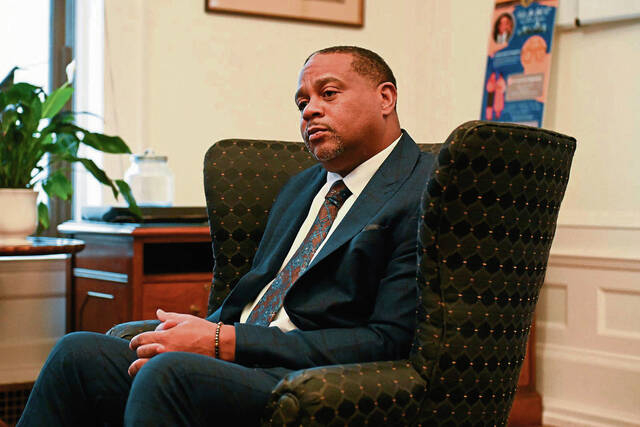Pittsburgh Mayor Ed Gainey and Allegheny County Controller Corey O’Connor laid out their plans on key issues such as traffic and city finances in a brief debate hosted Sunday by the 14th Ward Independent Democratic Club, with assistance from the 14th Ward Democratic Committee.
The two will face off in the May Democratic primary. The winner faces a Republican challenger in November. Police veteran Tony Moreno and businessman Thomas West are competing for the GOP nomination.
The winner of the mayoral election will contend with tough financial circumstances. Federal covid-19 relief is ending, a controversial tax on out-of-town performers and athletes is facing legal challenges and city revenues are dwindling as Downtown property values plummet.
O’Connor said Sunday the Gainey administration should have done more with $335 million the city received in federal covid-19 relief. He criticized Gainey for going on a “hiring spree when you know the city could not afford it,” adding new jobs to the city budget rather than investing in equipment, new vehicles and property improvements.
Gainey defended his administration’s spending, adding the city already was struggling with outdated equipment and understaffed departments when he took office. The mayor pointed out that the county — which, unlike the city, raised taxes for 2025 — is facing similar financial woes.
“We didn’t have to raise taxes,” Gainey said during the debate, held at Chatham University’s Eddy Theatre. “We stretched that money thin.”
Gainey has spent more than prior budgets had predicted in recent years, though his 2025 budget reflects a decrease in spending compared with last year.
Investing in city scrutinized
Gainey touted the roughly $4 million surplus the city had at the end of 2024 and the favorable bond ratings the city has maintained as proof of responsible budgeting.
O’Connor argued that the mayor was balancing the budget by leaving positions unfilled. Gainey had reduced the number of budgeted officers in the police bureau from 900 to 800, reflecting the city’s struggles to retain and recruit police personnel.
O’Connor repeatedly criticized Gainey for renting essential equipment, such as snowplows, rather than purchasing all of them outright. He criticized Gainey for not bolstering the city’s vehicle fleet, even as ambulances have broken down en route to the hospital.
“Our first move was to invest in core city services,” Gainey said.
He highlighted the work his administration has done to invest in infrastructure after the Fern Hollow Bridge fell in the city’s Frick Park just weeks after he took office in January 2022.
The mayor formed a bridge asset management program and increased maintenance work on the city’s bridges. Several other bridges have had to close during Gainey’s tenure because they were in poor condition.
O’Connor accused Gainey of doing too little to bolster basic city services.
He pointed out the city has taken days to clear all of its roads of snow after recent winter weather.
O’Connor also lambasted Gainey for reallocating money initially earmarked for recreation centers, like Troy Hill’s Cowley Recreation Center, to fund other projects. Gainey has proposed spending $8.63 million on the now-shuttered Cowley Recreation Center in 2027, but there’s no money in the budget to get the site up and running before then.
“We are not investing in our rec, in our youth and in our families,” O’Connor said, advocating for more programming for kids and stronger ties to the public school district. “If we are going to grow this city, it starts with young people and families.”
Gainey’s administration has worked to alleviate concerns about city finances, saying the city is “nowhere near Act 47,” the point at which the city’s finances would be in such bad shape as to require state oversight.
But O’Connor argued the city is on the path to serious financial troubles.
“You are plugging holes to get by in election season,” O’Connor said of Gainey’s budget plans, which have raised alarms among some city officials who fear the 2025 budget doesn’t include enough cash to cover essential costs like public safety overtime.
Traffic issues addressed
Despite disagreements over how to best handle the city’s finances and invest in core city services, the two largely agreed on easing traffic issues.
O’Connor lauded Gainey’s Vision Zero initiative, which aims to reduce to zero the number of fatal car crashes in the city.
“It does come down to safety,” O’Connor said, agreeing with the mayor that speed bumps can help slow drivers and curb dangerous wrecks.
If elected, O’Connor said he would use data from the automated red light enforcement cameras the city is poised to introduce this year to launch a more targeted approach, focusing on the most dangerous stretches of road in the city.
Gainey said the automated red light system should discourage dangerous driving without increasing direct interactions between police and drivers, which can sometimes grow tense. The cameras will allow officials to ticket violators without asking officers to initiate traffic stops.
“I want to make this city the safest city in America,” Gainey said.
Gainey, 54, of Lincoln-Lemington is finishing his first term as Pittsburgh’s mayor. The former state representative is seeking the Democratic nomination for a second term.
O’Connor, 40, is a former city councilman who serves as Allegheny County’s fiscal watchdog. He is the son of late Pittsburgh Mayor Bob O’Connor.











